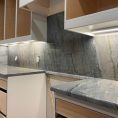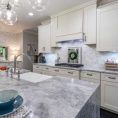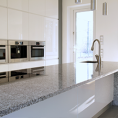Top Countertop Materials for Allergy-Friendly Homes
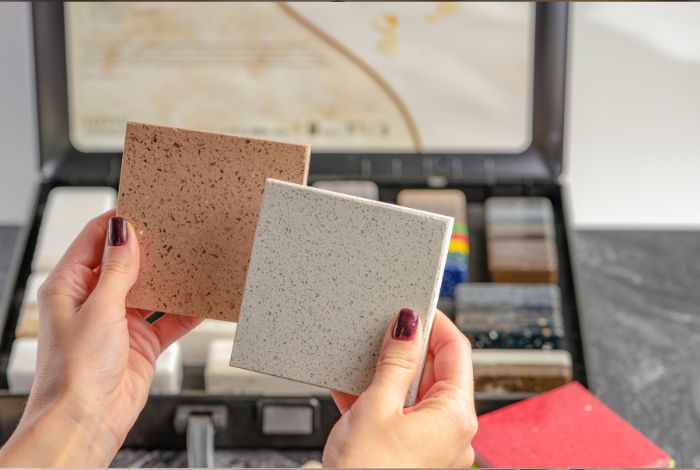
Creating an allergy-friendly home requires selecting materials that minimize allergens and are easy to clean and maintain. When it comes to countertops, certain materials are better suited for reducing allergens due to their non-porous nature, resistance to bacteria, and ease of cleaning. In this article, we’ll explore the top countertop materials for allergy-friendly homes, focusing on quartz, dolomite, granite, quartzite, marble, and porcelain. These materials not only provide style and durability but also help maintain a healthier living environment by reducing allergen accumulation.
Quartz Countertops
- Non-Porous Surface: Quartz is an engineered stone that is non-porous, making it highly resistant to bacteria, mold, and mildew. This feature ensures that allergens like dust and pollen don’t get trapped, making quartz a great option for allergy-friendly kitchens and bathrooms.
- Easy to Clean: The smooth, seamless surface of quartz makes it easy to wipe down and keep clean, reducing the potential for allergen buildup.
- Low Maintenance: Quartz countertops do not require sealing, which reduces the need for chemical cleaners, making it a healthier option for homes concerned about allergens and chemicals.
Dolomite Countertops
- Durable and Low Allergen: Dolomite offers a balance of durability and beauty while being relatively resistant to allergens. While dolomite is a natural stone, it can be sealed to create a barrier against moisture and allergens.
- Smooth and Elegant: Its smooth surface can be easily cleaned, preventing dust and other allergens from accumulating. Regular cleaning with mild soap and water ensures that the countertop remains allergy-friendly.
- Natural Beauty: Dolomite’s subtle elegance makes it a stylish option for homeowners looking for a beautiful and health-conscious surface.
Granite Countertops
- Sealed Surface for Reduced Allergens: Granite, when properly sealed, becomes non-porous, helping to prevent the absorption of moisture and the growth of bacteria, mold, or mildew. This makes granite a good choice for allergy-friendly environments.
- Durable and Long-Lasting: Granite is highly durable, standing up to daily cleaning and maintenance without damage, ensuring that allergens don’t linger on the surface.
- Natural Aesthetic: The natural patterns and colors of granite make it an appealing option while offering a cleaner, healthier environment when properly maintained.
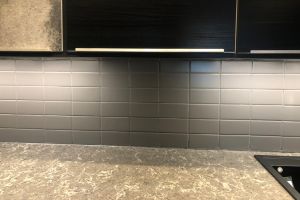
When it comes to countertops, certain materials are better suited for reducing allergens due to their non-porous nature, resistance to bacteria, and ease of cleaning.
Quartzite Countertops
- Tough and Easy to Clean: Quartzite is a natural stone with durability similar to granite. When sealed, it becomes non-porous, reducing the risk of allergens such as dust or mold infiltrating the surface.
- Resistant to Bacteria: Quartzite’s sealed surface also makes it resistant to bacteria, providing a healthier option for homes where air quality and allergen reduction are a priority.
- Elegant and Natural: The luxurious look of quartzite, combined with its allergy-friendly properties, makes it a top choice for kitchens and bathrooms where both health and style matter.
Marble Countertops
- Requires Sealing: While marble is a porous material, sealing it regularly helps to prevent moisture absorption and the growth of mold and mildew, which can trigger allergies.
- Smooth Surface: A properly sealed marble countertop can provide a smooth, elegant surface that is easy to wipe down and maintain, helping to reduce the buildup of allergens like dust and pollen.
- Classic Beauty: Despite its need for maintenance, marble remains a luxurious and timeless option for homeowners looking to balance style and an allergy-conscious environment.
Porcelain Countertops
- Non-Porous and Hygienic: Porcelain is naturally non-porous, which means it resists bacteria, mold, and allergens without the need for sealing. This makes porcelain an excellent choice for allergy-friendly homes.
- Easy to Clean: Porcelain countertops can be easily cleaned with mild soap and water, and their non-absorbent surface ensures that allergens don’t linger.
- Versatile and Durable: Porcelain comes in a wide range of colors and patterns, providing a stylish yet health-conscious option for any kitchen or bathroom design.
Conclusion
For homeowners looking to create an allergy-friendly environment, selecting the right countertop material is crucial. Quartz, dolomite, granite, quartzite, marble, and porcelain all offer options that are resistant to allergens like dust, bacteria, and mold while remaining easy to clean and maintain. By choosing one of these materials, you can create a beautiful and healthy home that supports a cleaner, allergy-conscious lifestyle.




